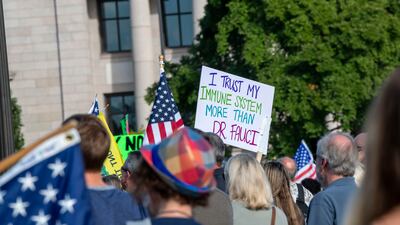More than a quarter of scientists who publicly aired their views on the Covid-19 pandemic have been threatened with death or violence, according to a new survey.
The 321 scientists from 20 countries who responded to the poll by Nature magazine said they had faced threats of sexual violence, professional complaints, racism, co-ordinated campaigns of harassment and menacing packages sent to their homes.
Forty-seven people, or 15 per cent of the total, reported having received death threats after speaking about Covid-19 to the media or posting on social media platforms. Two-thirds reported “negative” experiences after speaking out.
Cases of violent hostility towards public figures have emerged during the pandemic with victims including Dr Marc Van Ranst, a prominent virologist in Belgium.
He was forced to go into a safe house with his family after a heavily armed soldier threatened him before going missing and pledging to join the resistance. The soldier, Jurgen Conings, who became a hero among militant elements of the anti-vaxxer movement, was later found dead in a suspected suicide.
Anthony Fauci, the public head of the US Covid battle, was given security guards after he was threatened, and the UK’s chief medical officer, Chris Whitty, was jostled in the street. A German virologist received a parcel with a vial of liquid labelled “positive” and a note encouraging him to drink it.
But the findings pointed to widespread violent hostility towards people involved in the public campaign to combat the spread of the virus. Most of those who responded were from the UK, Germany or the US.
One physician in the US told Nature that she had received several death threats over the phone. Police told her to consider buying a gun. Another public health researcher received an email saying she and her colleagues should be executed after appearing on a news channel to discuss Covid-19.

“I have on occasion been threatened with various forms of death, violence and lifelong imprisonment,” said Dr Simon Clarke, an associate professor at the University of Reading, in England.
“I am fortunate to have felt able to ignore the threats I’ve received, but I know that some colleagues have had far worse experiences.”
The study suggested that experts were most likely to receive personal abuse on Twitter compared with other social media platforms.
Professor Chloe Orkin, president of the Medical Women’s Federation, said: “These findings demonstrate that the highly charged and polarised anti-science views surrounding Covid-19 coupled with the relative anonymity of social media have provided an ideal breeding ground for online abuse.”


